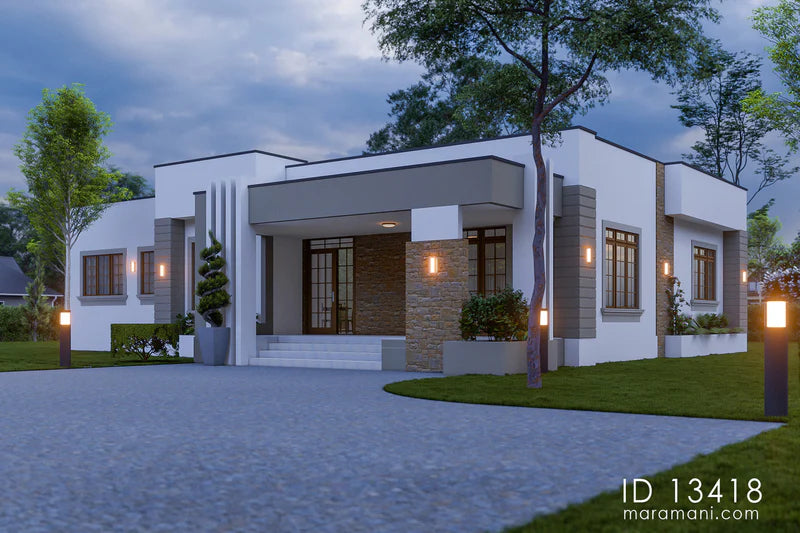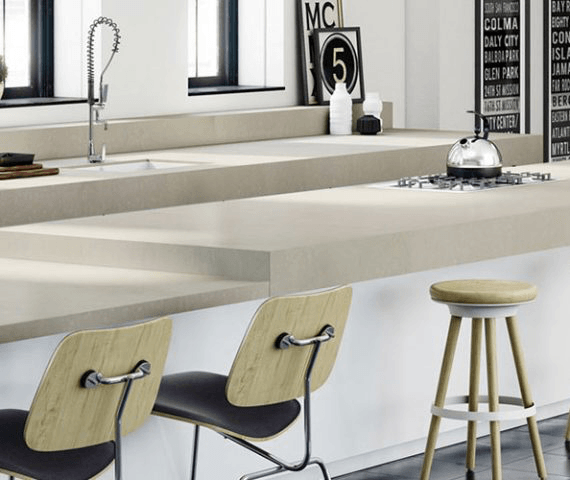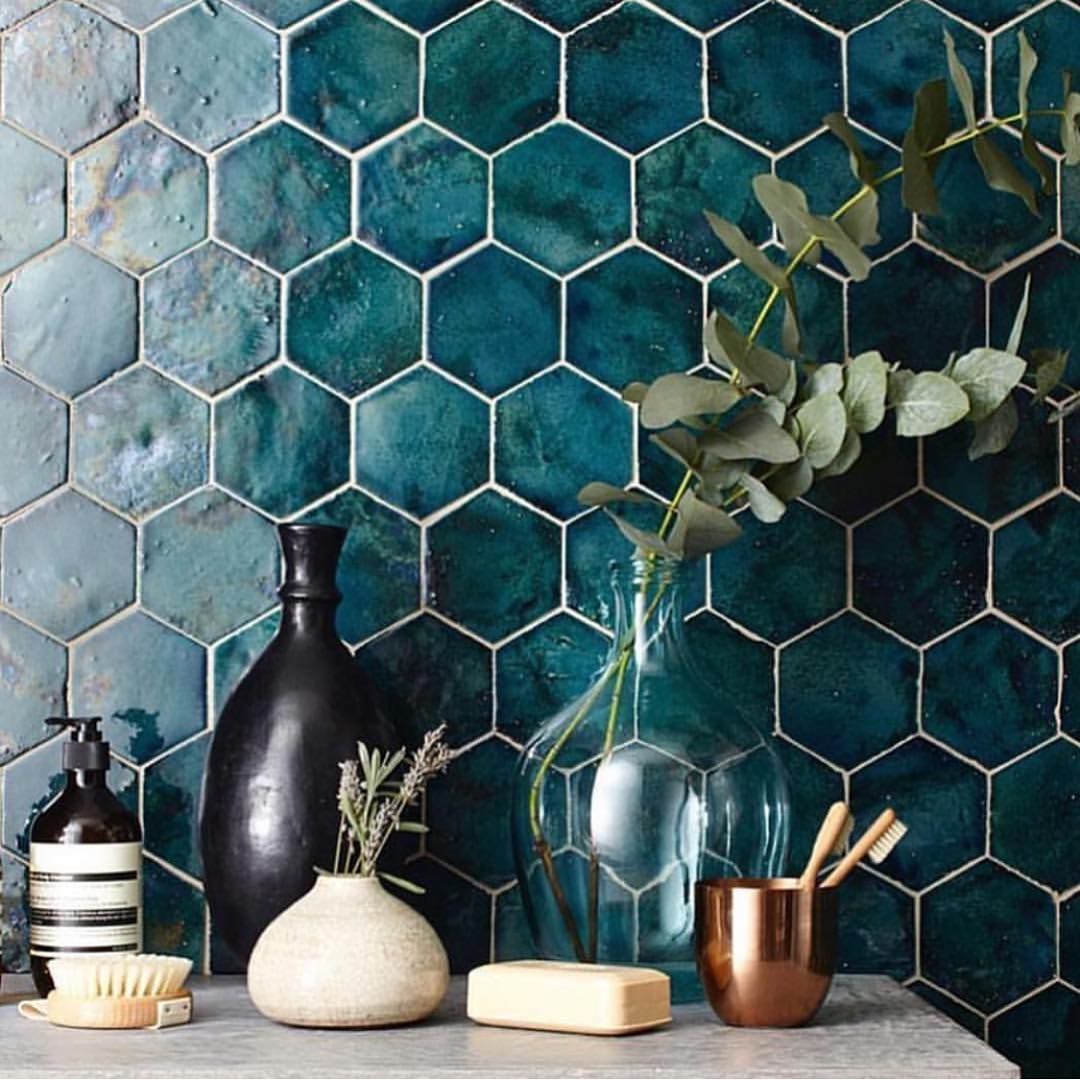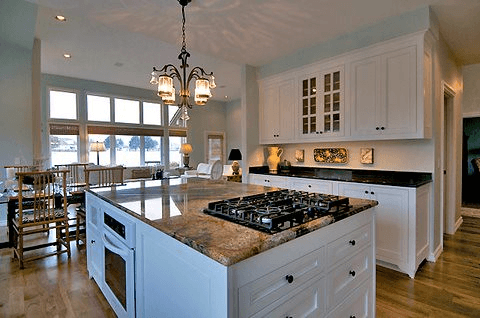Summary:
While we all are determined to figure out the right material and colour of a kitchen worktop, it’s equally important to consider the right thickness suitable for a countertop. To make the right decision, you first need to understand different worktop thickness as well as the requirements.

Image credit: mkwsurfaces.co.uk
When buying a new kitchen countertop, most people are so busy looking for the best material and colour that they neglect the “thickness.” The outcome is that they end up buying a thinner and lower quality worktop without knowing what they have purchased.
After some years when the material starts chipping or cracking, they declare that a particular stone is not good enough for worktops. But what’s wrong is their decision to invest in a thinner material for a dense traffic area.
To combat the problem, the homeowner must have complete knowledge of the popular worktop thicknesses and which ones are suitable for which areas of the home. Generally, there are three thicknesses of quartz and composite kitchen worktops. However, the marble and granite worktops are available in thicker slabs.
Different Thicknesses of Kitchen Worktops
2cm Worktops vs 3cm Worktops

Image credit: mkwsurfaces.co.uk
The two most common thicknesses of kitchen worktops Quartz are 2cm and 3cm. While there is around 2% to 40% difference between the prices of 2cm and 3cm worktops, the 2cm worktop is used for backsplashes or worktops that don’t bear much stress regularly. But this doesn’t make 2cm countertops out of the question. When installing a 2cm countertop, the experienced and professional fabricator will first lay down a strong plywood base before installing the slab.
But if you can afford it, it’s best to consider a 3cm countertop for regular usage. That is because it is structurally firmer and doesn’t require additional, backup support.
Thicker than 3cm
If budget is not a problem, it’s best to choose countertops thicker than 3cm. You can go for up to 6cm thick kitchen worktops to make a statement. Installing thicker worktop materials also symbolizes success at some level, as you can afford to invest in such marble or granite worktops.
While the 2cm and 3cm thicknesses of kitchen Quartz worktops are popular in 2019, you may install thicker worktops for unique aesthetic appeal. If you opt for a 6cm or thicker natural stone worktop, you can choose to carve a sink into your marble or granite slab. It will take your kitchen design to the next level for sure. Honestly, it’s one power move that your home design project needs to reach a completely different level. However, it’s not necessary to create this effect by installing a 6cm slab only. Even the clean seam and mitred edge look could also give an illusion of extra-thick countertops without spending too much or putting extra weight on your food preparation area.
Thinner than 2cm
There might be some projects where homeowner looks for thinner than 2cm composite kitchen worktops. When looking for thinner than 2cm, you’re usually looking for 1cm and 1.2cm thicknesses. However, such stones need to be fixed to some base to maintain its structural integrity. The marble and granite worktops are risky choices for 1cm thickness, and no fabricator would suggest doing so. Consider laminate or other engineered materials for 1cm thickness material options. The best application of this thin material is generally in large-scale construction projects like a mall or hotel where tile installation is suitable for weight reduction and budget maintenance.
How to decide which thickness is suitable for your worktops?
Generally, 3cm thickness is all the rage in 2019 and considered to be the ideal choice. It gives flexibility to a worktop design and also available in a wide range of designs and colours. You also don’t have to make an extra laminated edge with 3cm thick slab for hiding plywood underlayment. Furthermore, it gives the right amount of support and thickness to most quartz kitchen worktops.
2cm Quartz is also a good option and can be fixed without the additional need for plywood support. However, it does require assistance for overhangs above 8 inches. Although it is one of the desirable thicknesses for aesthetic appeal, it is not suitable for un-laminated 2cm worktops. This is because it can decrease a countertop’s overall height by ¾” until you make some extra adjustments to the cabinetry.
1cm Quartz or other worktop materials are usually utilized by builders and budget-conscious homeowners who need an inexpensive product that still looks like Quartz or natural stones. The 2cm and 3cm worktop thicknesses are far better than the prefabricated 1cm or 1.2cm thick materials that need additional plywood support. Besides, the thinner worktops are available in very limited produced sizes. This means the seams will be unavoidable with 1cm or 1.2cm worktops that are available in small tile sizes.
If you’re still confused about which countertop thickness to choose, undoubtedly the best is 3cm. It is a standard thickness for custom-cut worktops and also gives maximum durability and strength to different worktop options.






Leave a comment
This site is protected by hCaptcha and the hCaptcha Privacy Policy and Terms of Service apply.